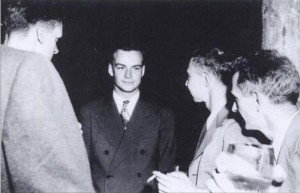 In the New York Review of Books, Freeman Dyson, who worked on nuclear-propelled spaceships among other great and scary things, reviews two new books about Richard Feynman (one, a gekiga). In the piece, he ranks science icons of the last century. The article’s opening:
In the New York Review of Books, Freeman Dyson, who worked on nuclear-propelled spaceships among other great and scary things, reviews two new books about Richard Feynman (one, a gekiga). In the piece, he ranks science icons of the last century. The article’s opening:
“In the last hundred years, since radio and television created the modern worldwide mass-market entertainment industry, there have been two scientific superstars, Albert Einstein and Stephen Hawking. Lesser lights such as Carl Sagan and Neil Tyson and Richard Dawkins have a big public following, but they are not in the same class as Einstein and Hawking. Sagan, Tyson, and Dawkins have fans who understand their message and are excited by their science. Einstein and Hawking have fans who understand almost nothing about science and are excited by their personalities.
On the whole, the public shows good taste in its choice of idols. Einstein and Hawking earned their status as superstars, not only by their scientific discoveries but by their outstanding human qualities. Both of them fit easily into the role of icon, responding to public adoration with modesty and good humor and with provocative statements calculated to command attention. Both of them devoted their lives to an uncompromising struggle to penetrate the deepest mysteries of nature, and both still had time left over to care about the practical worries of ordinary people. The public rightly judged them to be genuine heroes, friends of humanity as well as scientific wizards.
Two new books now raise the question of whether Richard Feynman is rising to the status of superstar.”
••••••••••
Dyson talks science at the Big Thin k:
k:
Tags: Freeman Dyson, Ricahrd Feynman
